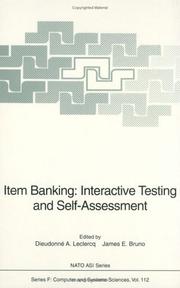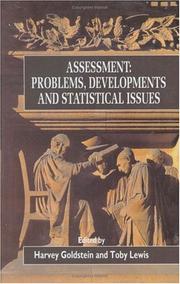| Listing 1 - 5 of 5 |
Sort by
|
Book
ISBN: 0805809643 9780805809640 Year: 1993 Publisher: Hillsdale ; Hove ; London : Lawrence Erlbaum Associates [LEA],
Abstract | Keywords | Export | Availability | Bookmark
 Loading...
Loading...Choose an application
- Reference Manager
- EndNote
- RefWorks (Direct export to RefWorks)
Educational tests and measurements --- Examinations --- Evaluation --- Congresses --- Design and construction --- Validity --- Educational tests and measurements - United States - Evaluation - Congresses --- Examinations - United States - Design and construction - Congresses --- Examinations - Validity - United States - Congresses

ISBN: 3540566538 3642634443 3642580335 9783540566533 Year: 1993 Volume: 112 Publisher: Berlin Springer
Abstract | Keywords | Export | Availability | Bookmark
 Loading...
Loading...Choose an application
- Reference Manager
- EndNote
- RefWorks (Direct export to RefWorks)
Assessment has long been recognized as a key feature in learning efficacy, especially through formative evaluation. Item banking, the storage and classification of test items, is an essential part of systematic assessment. This volume is based on a NATO Advanced Research Workshop held as part of the Special Programme on Advanced Educational Technology. The workshop brought together scholars from around the world to discuss and critically analyze the issues and problems associated with Subjective Probability Measurement (SPM) or the more generic research area called self-assessment. Recent advances in computer technology (expert systems, interactive video disks, and hypermedia) along with the developing sophistication of self-assessment scoring systems based on SPM made this conference particularly important and timely. The book is divided into three main parts: - The input: item banking and hypermedia - The process: subjective probabilities - The output: teaching and learning feedbacks. In summary, although SPM is a difficult theoretical concept for most educators to comprehend, the sophisticated nature of modern computer systems coupled with comprehensive formative and summative evaluation and self-assessment systems make SPM transparent to the user.
#psyc:gift 1996 --- Validity --- Educational tests and measurements --- Examinations --- Probabilities --- Teaching --- Data processing --- Congresses --- Educational tests and measurements - Europe - Data processing - Congresses --- Examinations - Validity - Europe - Congresses --- Probabilities - Congresses --- Teaching - Congresses
Book
ISBN: 9781544334486 1544334494 1544334486 1544334478 154433446X 1071878816 1071878816 Year: 2021 Volume: 184 Publisher: Los Angeles, Calif. Sage
Abstract | Keywords | Export | Availability | Bookmark
 Loading...
Loading...Choose an application
- Reference Manager
- EndNote
- RefWorks (Direct export to RefWorks)
Carol A. Chapelle shows readers how to design validation research for tests of human capacities and performance. Any test that is used to make decisions about people or programs should have undergone extensive research to demonstrate that the scores are actually appropriate for their intended purpose. Argument-Based Validation in Testing and Assessment is intended to help close the gap between theory and practice, by introducing, explaining, and demonstrating how test developers can formulate the overall design for their validation research from an argument-based perspective.
Quantitative methods in social research --- Examinations --- Educational tests and measurements --- Psychological tests --- Validity. --- Evaluation. --- #SBIB:303H12 --- Methoden en technieken: sociale wetenschappen --- Examinations - Validity. --- Educational tests and measurements - Evaluation. --- Psychological tests - Evaluation.

Abstract | Keywords | Export | Availability | Bookmark
 Loading...
Loading...Choose an application
- Reference Manager
- EndNote
- RefWorks (Direct export to RefWorks)
Mathematical statistics --- Education--Tests et mesures --- Educational tests and measurements --- Onderwijs--Tests en metingen --- Opvoedkunde--Tests en metingen --- Opvoedkundige tests en metingen --- Test bias --- Tests -- Déformations --- Tests et mesures en éducation --- Testvertekening --- Educational tests and measurements. --- Examinations --- Test bias. --- Lerarenopleiding --- Statistics. --- Interpretation. --- Validity. --- (vak)didactiek wetenschappen --- (vak)didactiek wetenschappen. --- Statistics --- Evaluation --- Validity --- Interpretation (Phrasing, dynamics, etc.) --- Educational tests and measurements - Statistics. --- Examinations - Validity. --- Examinations - Interpretation.
Book
ISBN: 1351136496 1351136488 135113650X 0815353391 0815353405 9780815353409 9780815353393 Year: 2019 Publisher: Taylor & Francis
Abstract | Keywords | Export | Availability | Bookmark
 Loading...
Loading...Choose an application
- Reference Manager
- EndNote
- RefWorks (Direct export to RefWorks)
Score reporting research is no longer limited to the psychometric properties of scores and subscores. Today, it encompasses design and evaluation for particular audiences, appropriate use of assessment outcomes, the utility and cognitive affordances of graphical representations, interactive report systems, and more. By studying how audiences understand the intended messages conveyed by score reports, researchers and industry professionals can develop more effective mechanisms for interpreting and using assessment data.Score Reporting Research and Applications brings together experts who design and evaluate score reports in both K-12 and higher education contexts and who conduct foundational research in related areas. The first section covers foundational validity issues in the use and interpretation of test scores; design principles drawn from related areas including cognitive science, human-computer interaction, and data visualization; and research on presenting specific types of assessment information to various audiences. The second section presents real-world applications of score report design and evaluation and of the presentation of assessment information. Across ten chapters, this volume offers a comprehensive overview of new techniques and possibilities in score reporting.
Educational tests and measurements --- Examinations --- Grading and marking (Students) --- Evaluation. --- Validity. --- Graded schools --- Marking (Students) --- Students --- School reports --- Test results --- Test validity --- Validity of examinations --- Grading and marking --- Interpretation --- Rating of --- Educational tests and measurements - Evaluation --- Examinations - Validity --- Andrew Krumm --- April L. Zenisky --- Francis O'Donnell --- Gautam Puhan --- Gavin T. L. Brown --- John A. C. Hattie --- Linda Corrin --- Lisa A. Keller --- Marc Silver --- Mary Hegarty --- Mingyu Feng --- Priya Kannan --- Rebecca Zwick --- Richard J. Tannenbaum --- Ronald K. Hambleton --- Samuel A. Livingston --- Sandip Sinharay --- Sharon Slater --- Shelby J. Haberman --- Shuchi Grover --- Stephen G. Sireci --- Timothy M. O'Leary --- Yooyoung Park
| Listing 1 - 5 of 5 |
Sort by
|

 Search
Search Feedback
Feedback About UniCat
About UniCat  Help
Help News
News